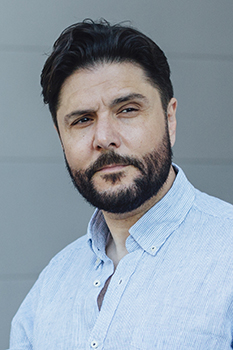
Biography
Born in Naples, Massimo Giordano has been acclaimed at most of the leading opera houses in the world, such as the Royal Opera House, Covent Garden, Paris Opera, Deutsche Oper Berlin, Vienna State Opera, Bolshoi Theatre in Moscow, Rome Opera, Metropolitan Opera, Zürich Opera House, Teatro alla Scala in Milan, and Bavarian State Opera in Munich. Giordano studied flute and voice at the Conservatorio G. Tartini in Trieste, completing his vocal studies under Cecilia Fusco. After winning numerous vocal competitions, Giordano made his professional debut in 1997 as the title role in Mozart’s La Clemenza di Tito in Spoleto. In 2001, he debuted at the Teatro alla Scala in Verdi’s Il Giorno di Regno and at the Salzburg Festival as Fenton in Falstaff (under Claudio Abbado and later under Lorin Maazel). His international debuts followed in quick succession.In the first part of his career, Giordano concentrated on lyric repertoire, appearing as Rodolfo in La Bohème at the Paris Opera, Bavarian State Opera, Vienna State Opera, Covent Garden, Berlin State Opera, Metropolitan Opera and Los Angeles Opera; Alfredo in La Traviata at the Metropolitan Opera, Bavarian State Opera, Deutsche Oper Berlin, Bolshoi Theatre, Berlin State Opera, Teatro Regio in Parma, Teatro Giuseppe Verdi in Trieste, Teatro alla Scala (under Lorin Maazel), Los Angeles Opera and Santa Fe Opera (for his American stage debut); Roméo in Roméo et Juliette at the Bavarian State Opera, Frankfurt Opera House, Lyric Opera of Chicago and Pittsburgh Opera; Des Grieux in Manon at the Teatro alla Scala, Vienna State Opera (opposite Anna Netrebko) and Metropolitan Opera (opposite Renée Fleming); Nemorino in L’elisir d’amore at the Opera de Monte Carlo and Vienna State Opera; Fenton in Falstaff at the Semperoper Dresden and Covent Garden (under Antonio Pappano); Rinuccio in Gianni Schicchi at the Metropolitan Opera (under James Levine) and Glyndebourne Festival (under Vladimir Jurowski); and Lensky in Eugene Onegin at Glyndebourne (also under Vladimir Jurowski).
Giordano subsequently added several lirico-spinto roles to his repertoire, appearing as Don José in Carmen at the Deutsche Oper Berlin, Arena di Verona, Vienna State Opera and Zürich Opera. He sang his first Cavaradossi in Tosca at the Dallas Opera and has since sung the role at the Bavarian State Opera, Vienna State Opera, Teatro dell'Opera di Roma, Semperoper Dresden, Stuttgart Opera, San Francisco Opera and Covent Garden, among others. Most recently, he sang Cavardossi at the Opéra de Lyon, and he will soon reprise the role at the Vienna State Opera. He has also won special praise in the title role of Don Carlos, which he has sung at the Deutsche Oper Berlin, Dutch National Opera and Maggio Musicale Fiorentino. In the autumn of 2019, Giordano first sang the French Version of Don Carlos in the new production at the Stuttgart Opera. He debuted as Gabriele Adorno in Simon Boccanegra at the Hamburg State Opera and Foresto in Attila in Lyon and Paris, as well as Des Grieux in Puccini’s Manon Lescaut with the Berlin Philharmonic in Baden Baden and Berlin, under Sir Simon Rattle. He later sang this role at Covent Garden, under Sir Antonio Pappano, and at the Deutsche Oper Berlin. A role that has accompanied Giordano throughout his career is Massenet's Werther. He sang his first Werther at the outset of his career in Spoleto and has since performed the role in many theaters, including Berlin, Zürich, Toulouse, Munich, and most recently for the Opera du Rhin in Strasbourg. Giordano began the 2020/21 season with a return to Strasbourg for his first Samson in Samson et Dalila.
Massimo Giordano often performs in concert and has sung Verdi’s Requiem under Riccardo Chailly in Amsterdam, Toulouse, Vienna, Dresden and Budapest, under Zubin Mehta in Tel Aviv, and under Gianluigi Gelmetti in Rome and Sydney. He has also worked with such conductors as Claudio Abbado, Bruno Campanella, Riccardo Chailly, Alain Guingal, Gabriele Ferro and Michel Plasson, and with such stage directors as Declan Donnellan, Alberto Fassini, Pierluigi Pizzi, Luca Ronconi, Graham Vick, and Franco Zeffirelli.
All in group
- Yaroslav Abaimov
- Wolfgang Ablinger-Sperrhacke
- Pietro Adaíni
- Migran Agadzhanyan
- Mikhail Agafonov
- Michele Angelini
- Liparit Avetisyan
- Hovhannes Ayvazyan
- Kristian Benedikt
- Peter Berger
- Giorgio Berrugi
- Francisco Brito
- Javier Camarena
- Andrea Caré
- Arturo Chacón-Cruz
- Shota Chibirov
- Marco Ciaponi
- John Daszak
- Bekhzod Davronov
- Freddie De Tommaso
- Timofei Dubovitsky
- Valentin Dytiuk
- Sergio Escobar
- Yusif Eyvazov
- Walter Fraccaro
- Ruzil Gatin
- Massimo Giordano
- Davide Giusti
- Diego Godoy
- Dmitry Golovnin
- Vittorio Grigolo
- Mikhail Gubsky
- Brenden Gunnell
- Ivan Gyngazov
- Teodor Ilincai
- Brian Jagde
- Otar Jorjikia
- Murat Karahan
- Tuomas Katajala
- Dmitry Korchak
- Rame Lahaj
- Matteo Lippi
- Josh Lovell
- Aquiles Machado
- Eduard Martynyuk
- Riccardo Massi
- Nazhmiddin Mavlyanov
- Maxim Mironov
- Martin Muehle
- Alexander Murashov
- Tomislav Mužek
- Alexei Neklyudov
- Yaramir Nizamutdinov
- Dovlet Nurgeldiyev
- Pene Pati
- Pavel Petrov
- Saimir Pirgu
- Mikhail Pirogov
- Antonio Poli
- Sergey Polyakov
- Andrei Popov
- Dmytro Popov
- Sergei Radchenko
- Bernard Richter
- Iván Ayón Rivas
- Gaston Rivero
- Edgardo Rocha
- Sergey Romanovsky
- Boris Rudak
- Giovanni Sala
- Juan Sancho
- Sergei Semishkur
- Shanul Sharma
- Yijie Shi
- Sergei Skorokhodov
- Mert Süngü
- Kenneth Tarver
- Alexei Tatarintsev
- Klim Tikhonov
- Alexander Trofimov
- Fabio Trümpy
- Pavel Valuzhin
- Vincent Wolfsteiner
- Azer Zada



